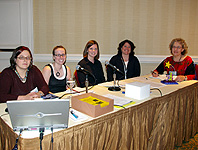Children's Books: A Growth Industry
 Panelists at Thursday's session for children's booksellers, sponsored by ABA and ABC, were (from left): Kristen McLean, Erin Taylor, Emily D'Amour, Elizabeth Bluemle, and Carol Chittenden. |
"Getting More Out of Your Children's Section: Managing Selection, Service, and Store Environment for Category Growth" was the subject of a panel at the American Booksellers Association's Thursday Day of Education at BookExpo America. The session was presented in conjunction with the Association of Booksellers for Children (ABC) and moderated by Kristen McLean, ABC's executive director. Panelists included Carol Chittenden of BookStream, Inc. and Eight Cousins children's bookstore in Falmouth, Massachusetts; Elizabeth Bluemle, author and owner of The Flying Pig Bookstore in Shelburne, Vermont; and booksellers from this year's winners of the Lucile Micheels Pannell Award -- Emily D'Amour of Books & Books in Miami and Coral Gables, Florida (the general bookstore category) and Erin Taylor of Wonderland Books and Toys in Rockford, Illinois (the children's bookstore category).
An ABC flier given to booksellers attending the session put the business of selling children's books in perspective. The handout "Selling Children's Books Is More than Just Child's Play" presented statistics showing that 10 billion dollars in children's books were sold in the U.S. from 2002 to 2005. While overall net book sales grew by just 4.4 percent during that time, children's books in all formats averaged 11.2 percent growth.
McLean said that a strategic approach was needed to manage a children's section, and she identified three critical areas that booksellers needed to address: building a kid-friendly environment, cultivating charismatic kids' book specialists, and selecting the right books.
Specific bookstores were noted for their skill at creating dynamic and inviting environments for children. McLean mentioned Wild Rumpus Bookshop in Minneapolis, Minnesota, and Reading Reptile in Kansas City, Missouri, for their creative displays and frequent transformations. Little Bookworms in Bradenton, Florida, had an artist create a giant tree in the store, said McLean, which has become the focal point for visitors. The importance of "soft spaces" in children's sections was emphasized. This can be accomplished through the use of beanbag chairs or large pillows in a reading nook.
Chittenden spoke of the importance of high quality personnel with fresh ideas. She advised looking beyond the typical word-of-mouth and friend-of-a-friend hires, and suggested instead advertising in local papers and on relevant websites to find outsiders who may have completely different and useful perspectives.
"Longtime staffers establish their domain," Chittenden cautioned. Because they may become proprietary and inflexible, she suggested making changes every three or four years.
Chittenden also discussed the importance of good supervision with clear expectations. As an example, she described the employee who is not told about the store's policy that prohibits gum chewing. "If you don't tell them ahead of time [about the rule] and wait until they do it," Chittenden said, "then you are criticizing them when you point it out. Best to inform them first and then let them know that they are breaking a rule."
An investment in staff's knowledge, she said, certainly pays off. Expecting a bookseller to spend 25 minutes twice a week reading new books and five minutes a week telling a supervisor about the books is practical and reasonable. Similar discussions and presentations at staff meetings are also helpful, Chittenden added. Since by all estimates a very high percentage of children's books are handsold, enthusiastic, motivated booksellers are essential.
Bluemle of The Flying Pig immediately established her tremendous enthusiasm and motivation for selling children's books and spoke of the importance of selecting the best titles from a large pool. She noted that award winners and other "stickered" books, reviewers' choices, Book Sense picks, and staff favorites are all good choices since they have already been vetted and preselected.
Bluemle also mentioned the need to develop a special category of "grandma books," those that can be quite expensive, since "no one is willing to spend more money on books than grandparents." She noted that art museum gift shops are often places to find some high-end, unusual gift books.
In addition, Bluemle advised booksellers to keep abreast of local school curricula and summer reading lists. Noting that backlist tiles are crucial to all children's booksellers and may comprise about 80 percent of inventory, she suggested hiring a children's librarian for a limited time to create an inclusive, deep backlist.
This year's Pannell winners shared some of the special programs, events, and creative ideas that brought them to the attention of the Women's National Book Association, which presents the awards each year.
D'Amour offered suggestions based on the inventive and inexpensive events that helped Books & Books win its Pannell Award, including partnering with organizations or programs for book-themed events. She noted that working with groups, such as a ballet school or fencing program, widen the event's exposure and attract new customers to the store. In exchange, the group provides the activity -- a demonstration or class.
One great success was a teen program built around the book Twisted by Laurie Halse Anderson (Viking). D'Amour invited several local teen bands to compete in "Books & Beats: Teen Bands Jam Night," and the store served refreshments; everything was free. Best of all, only those under 18 were permitted in; proof of age was required.
Programs at Taylor's Wonderland Books, which was cited by the Pannell committee "for having an overall commitment to community outreach as actual 'good works' beyond typical store marketing or promotional motivation," include working with Head Start and programs aimed at developmentally delayed children. Taylor touched on the topic of a bookstore's space and turning a liability into an asset. She recommended that booksellers improvise and find solutions for imperfect spaces in creative ways. --Nomi Schwartz

